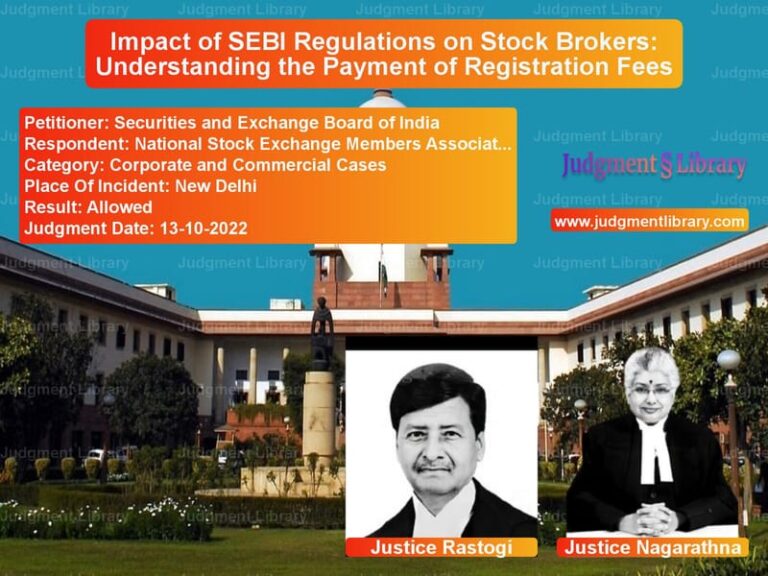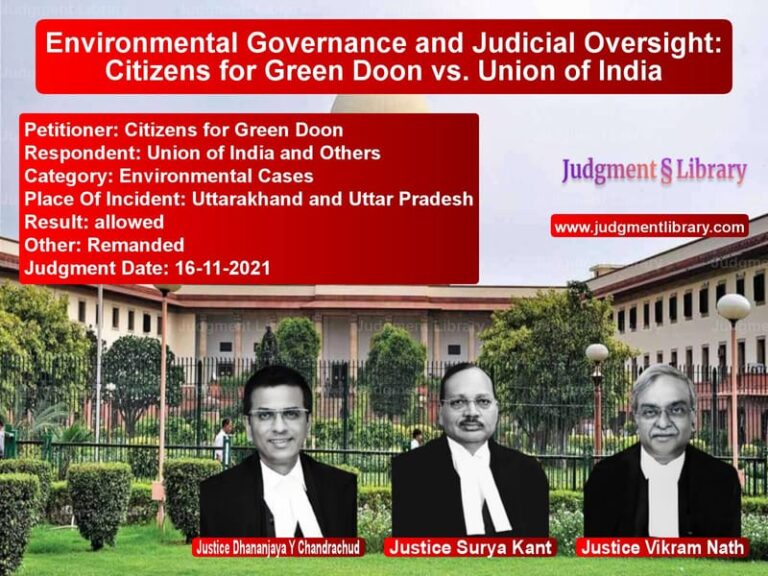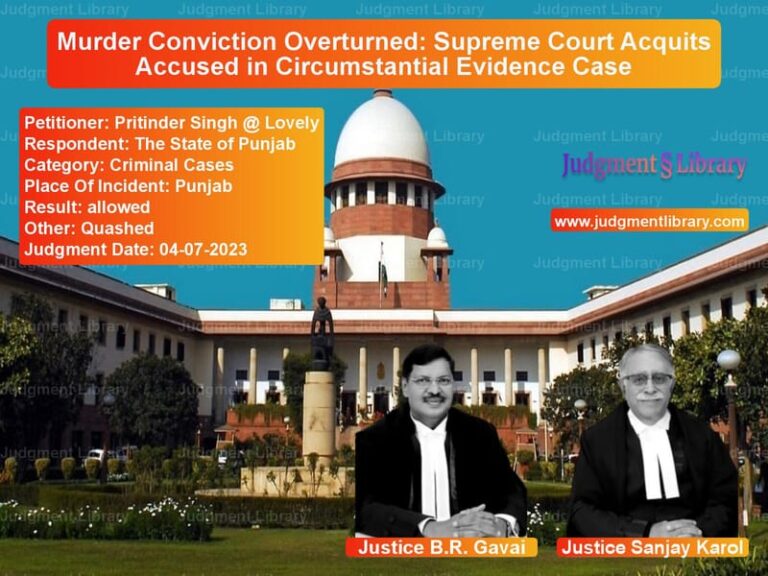Family Property Dispute Resolved: Supreme Court Upholds Sale Deed in Partition Case
The Supreme Court of India recently delivered a judgment in the case of Srinivas Raghavendrarao Desai (Dead) by LRS. vs. V. Kumar Vamanrao @ Alok & Ors., concerning a longstanding family property dispute. The judgment clarifies important legal principles regarding partition, sale of ancestral property, and the validity of transactions executed during the pendency of legal proceedings.
Background of the Case
The dispute arose from a family partition involving multiple properties in Dharwad and Hubli. The plaintiffs, Kumar Vamanrao @ Alok, Kumar Vyas @ Prateek Sudheendra Desai, and their mother, Aruna, filed a suit against their father, Sudheendra Desai, and other family members, seeking partition and a share in the family properties.
Several properties were in contention, and the plaintiffs sought to claim 5/9th of the ancestral assets. The main issues revolved around:
- The validity of a partition allegedly conducted in 1965 versus a later partition in 1984.
- The status of properties bearing Survey No. 106/2 and Survey No. 44/4.
- The legality of a sale deed executed in 2001 by the appellant, Srinivas Raghavendrarao Desai, in favor of defendant No. 9, Murugharajendra Vidyapeeth.
Key Legal Issues
- Whether the 1965 partition was valid or if the 1984 partition governed the distribution of properties.
- Whether the sale deed executed in 2001 by defendant No. 7 (the appellant) was legally binding.
- Whether the plaintiffs had a legitimate claim over the disputed properties.
- Whether the High Court correctly set aside the 1984 partition.
Arguments by the Appellant (Srinivas Raghavendrarao Desai)
The appellant, through his legal representatives, contended that:
- The High Court erroneously relied on the alleged 1965 partition, which was never pleaded by the plaintiffs in their original suit.
- The amendment to introduce the 1965 partition was rejected by the trial court, and no appeal was filed against that order.
- The 1984 partition, which was recorded in Civil Suit No. 80 of 1995, had already been recognized and executed.
- The sale deed of Survey No. 106/2, executed in 2001, was a legitimate transaction and should be upheld.
- The plaintiffs were attempting to deprive the rightful owners of their legitimate shares through unsubstantiated claims.
Arguments by the Respondents (Plaintiffs)
The plaintiffs argued that:
- The 1965 partition was the governing document and should be recognized as the valid partition.
- The 1984 partition was fraudulent and designed to deprive them of their rightful share.
- The sale deed executed in 2001 by the appellant was in violation of an interim court order and should be nullified.
- The High Court correctly divided the properties among the rightful heirs.
Supreme Court’s Observations
1. Importance of Pleadings in Legal Disputes
The Court emphasized that no evidence can be introduced beyond the pleadings. It noted:
“There is no quarrel with the proposition of law that no evidence could be led beyond pleadings. The plaintiffs attempted to introduce a claim of a 1965 partition through an amendment, which was rightly rejected by the trial court. The High Court erred in relying on the 1965 partition.”
2. Validity of the 1984 Partition
The Court ruled that the 1984 partition was the legitimate one, as it was recorded in Civil Suit No. 80 of 1995. The Court observed:
“The partition deed dated 30.08.1984 between the family members clearly established that Survey No. 106/2 and 44/4 were allocated to the appellant’s branch of the family.”
3. Legitimacy of the Sale Deed
Addressing the challenge to the sale deed of Survey No. 106/2, the Court held:
“The sale deed executed by the appellant in 2001 was lawful, as he was the rightful owner of the property under the 1984 partition. The High Court’s decision to nullify the sale was incorrect.”
4. No Violation of Interim Orders
The respondents contended that the sale deed was executed in violation of an interim order. However, the Court found:
“As of 31.05.1999, when the interim order was passed, the appellant was not even a party to the suit. He was impleaded only on 02.01.2001, and no extension of the interim order was issued to cover him.”
Final Judgment
The Supreme Court ruled in favor of the appellant and set aside the High Court’s findings regarding Survey No. 106/2 and 44/4. The Court held:
“The appeals are allowed. The findings of the High Court with reference to Survey Nos. 106/2 and 44/4 are set aside. The sale deed executed in favor of defendant No. 9 is upheld.”
Implications of the Judgment
This ruling has significant implications for property disputes and partition cases:
- Clarifies the importance of pleadings: Claims must be based on original pleadings, and unpleaded claims cannot be entertained later.
- Strengthens partition enforcement: The ruling reinforces that a legally executed partition cannot be set aside arbitrarily.
- Protects legitimate property transactions: A sale executed by a rightful owner cannot be invalidated based on subsequent claims.
- Restricts misuse of interim orders: Courts must carefully examine whether an interim order applied to a specific party before ruling on alleged violations.
This judgment serves as a guiding precedent for partition disputes and the validity of property sales executed by rightful owners.
Petitioner Name: Srinivas Raghavendrarao Desai (Dead) by LRS..Respondent Name: V. Kumar Vamanrao @ Alok & Ors..Judgment By: Justice C.T. Ravikumar, Justice Rajesh Bindal.Place Of Incident: Dharwad, Karnataka.Judgment Date: 04-03-2024.
Don’t miss out on the full details! Download the complete judgment in PDF format below and gain valuable insights instantly!
Download Judgment: srinivas-raghavendra-vs-v.-kumar-vamanrao-@-supreme-court-of-india-judgment-dated-04-03-2024.pdf
Directly Download Judgment: Directly download this Judgment
See all petitions in Property Disputes
See all petitions in Succession and Wills
See all petitions in Landlord-Tenant Disputes
See all petitions in Contract Disputes
See all petitions in Judgment by C.T. Ravikumar
See all petitions in Judgment by Rajesh Bindal
See all petitions in allowed
See all petitions in Quashed
See all petitions in supreme court of India judgments March 2024
See all petitions in 2024 judgments
See all posts in Civil Cases Category
See all allowed petitions in Civil Cases Category
See all Dismissed petitions in Civil Cases Category
See all partially allowed petitions in Civil Cases Category







